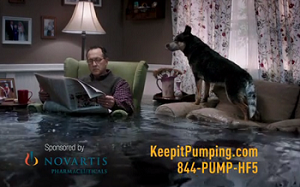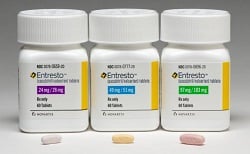It's not often that a disease-awareness campaign makes unwanted waves. But Novartis' ($NVS) recently launched heart failure push is doing just that--literally and figuratively.
 |
| Novartis' "Rising Waters" Ad |
A TV commercial uses rising water to illustrate the threat of heart failure, and as CardioBrief notes, it's a terrifying depiction. The TV ad and accompanying print work have prompted criticism from doctors, including the cardiologist, Milton Packer, who headed up a key trial testing Novartis' new heart failure pill Entresto, the CV-focused blog reports.
In the commercial, a man sits reading a newspaper while water slowly floods his living room, with a heartbeat out of Edgar Allan Poe serving as background noise. The man's dog seeks higher ground, whining in fear, but the man appears oblivious.
"With heart failure, danger is always on the rise. Symptoms worsen because your heart isn't pumping well," a voice-over states. "About 50% of people die within 5 years of getting diagnosed. But there's something you can do. Talk to your doctor about heart failure treatment options. Because the more you know the more likely you are to keep it pumping."
Drugmakers often use disease awareness campaigns in a drug launch, to prime the pump for branded DTC ads. Bristol-Myers Squibb ($BMY), for instance, ran an educational campaign about cancer immunotherapies to accompany the rollout of its PD-1 drug Opdivo. And that's just one recent example.
Typically, those campaigns are more upbeat. But this one obviously is not. "This ad really disturbs me," Packer told CardioBrief. "It is alarmist, and I am not certain that is a good thing for patients." Two other leading cardiologists said the ad was "horrifying" and designed to "evoke fear and uncertainty" and "play on the fears of patients," the blog reports.
Regardless of content, however, Packer appears to take issue with the very idea of an early consumer-ad push, be it awareness-oriented or branded. He agrees that there's good reason to alert patients to new heart failure treatments, but he thinks physicians should take the lead, not TV commercials. Cardiologists should "digest the data and have a debate," Packer argued, and that's just what's happening now that Entresto is part of the treatment mix.
In this he's echoing the American Medical Association, which recently voted to back a ban on direct-to-consumer advertising. The group blamed DTC advertising for inflating demand for new and expensive--and potentially unnecessarily prescribed--drugs. Before the vote, many physicians testified about the negative impact DTC advertising has on their practices and patient relationships, but others opposed the ban, saying consumer ads are a valuable educational tool.
 Novartis has been reaching out to doctors on Entresto's behalf since its launch last year and stepped up those efforts after the drug got off to a slow start last fall. In January, the company retrained its Entresto sales force to better target doctors whose patients might be covered by reluctant payers.
Novartis has been reaching out to doctors on Entresto's behalf since its launch last year and stepped up those efforts after the drug got off to a slow start last fall. In January, the company retrained its Entresto sales force to better target doctors whose patients might be covered by reluctant payers.
Cardiologists have been using cheap generics to treat heart failure for years now, Novartis execs noted in November, and they won't automatically switch to a new, costly drug; Entresto's list price is $4,500 per year. Even those doctors already aware of--and sold on--Entresto's benefits aren't likely to push reluctant payers to cover it.
But Novartis also knows that a successful new launch also depends on demand from patients. "[W]hen a patient or caregiver actually asks the doctor for the drug, they're much more likely to get it," pharma chief David Epstein pointed out. "So, we need to make sure that patients and caregivers are hearing about the medicine as well."
Now, Novartis says its campaign is just an attempt to inspire patients to learn more and take action. "We developed the Keep It Pumping ad with those intentions--to educate people and facilitate patient-physician dialogue," the company said in a statement. In response to questions about its 50% 5-year death rate, the company added, "according to stats published in NEJM and JAMA, about 50% of people diagnosed with heart failure die within five years. This is widely cited--by organizations like CDC and AHA."
- read the CardioBrief news
- here's the ad
Special Reports: Top 10 most advertised prescription drug brands